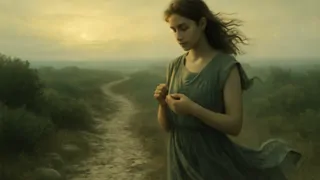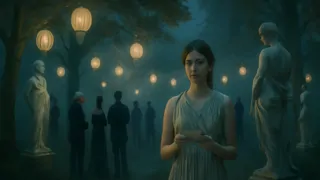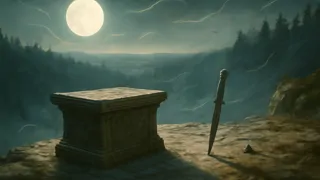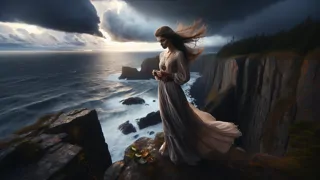Introduction
High above the grey sweep of the Pacific, wind bowed the battered pines at the edge of a jagged cliff. Iphigenia West stood alone, her hair a tangle of obsidian ribbons that flecked the air like scattered ink. Beneath her bare feet, coastal scrub slithered toward the rocks, and the sea’s voice rose in cold, haunting murmur. She reached for the slender locket that lay warm against her skin, fingers trembling at the touch of mottled bronze. Inside, a faded portrait of her Greek immigrant grandmother peered back with stern affection. That image anchored her here, thousands of miles from the olive groves and stony temples of ancient Argos, yet bound by the same knot of destiny. Her mother’s final words echoed behind her: “You carry our past in every beat of your heart.” In this breath, she felt the weight of a thousand years press against her collarbone, whispering promises of sacrifice and renewal. The wind braided around her ankles as if to drag her closer to the abyss. She closed her eyes and let it carry memory: the lullaby sung in a smoky hearth, the echo of trumpets in golden halls, the hush before a blade’s cruel arc. She tightened her grip on the cold metal, feeling both terrified and strangely exhilarated by what lay ahead. Tonight, the wind would carry her story across water and memory, bridging the gulf between ancient sacrifice and modern resolve.
Roots of Sacrifice
High above the restless surf, Iphigenia’s memory returned like a tide, rolling secrets against an indifferent shore. She remembered the hush in her grandmother’s small Bay Area flat, where walls bore sepia-toned photographs of olive groves and crumbling temples. In that kitchen’s warm lamplight, old stories—half-remembered myths of gods and mortals—wove around her childhood like fine threads in a tapestry. She still felt the pulse of that hearth under her small palms, heard the careful caution in her grandmother’s voice when she spoke of promise and betrayal, destiny and deliverance.Those recollections clung to her now, slipping through her fingers with the wind’s song.

Halfway down the cliff path, twisted roots of melaleuca and scraggly manzanita wrapped around exposed bedrock, a stubborn testament to life’s tenacity against the elements. Iphigenia traced a finger along one gnarled branch and imagined the roots as the tendrils of an ancient covenant, binding her to choices made long before her birth. Each footfall carried her away from the innocuous comforts of modern suburbia and into the mythos she’d tried to outrun. Yet even here—far from city lights and digital hum—she found no repose. Instead, she felt the stark clarity of the wind’s will, urging her toward horizons she could not name, toward horizons that would demand a price she could not imagine.
By dusk, the horizon was alight with burnished gold and bruised purples, and Iphigenia perched on a boulder worn smooth by rain and salt spray. She opened her locket again to study the miniature face inside, noticing for the first time the gentle contours of her grandmother’s expression—resigned, hopeful, unwavering. Memories surged: her grandmother’s final letter, slipped into Iphigenia’s palm by candlelight, containing a warning drawn from ancient script. Iphigenia’s breath caught as she read the translated psalm offered as a guide for survival: “The wind may carry you beyond safe harbor, but you alone will choose which port to greet.” She closed the locket, pressing it to her heart. In that moment, she understood that sacrifice need not end in sorrow. Instead, it could be the crucible through which she forged her own fate.
The Gathering Storm
Night fell like a velvet curtain embroidered with distant stars, yet even the heavens seemed unsettled. The wind sharpened its edge, rattling branches in wild percussion around Iphigenia as she descended the cliff toward the private festival at her family’s estate. Lanterns strung between eucalyptus trees cast flickering shadows over marble statues, each figure draped in classical robes that bore the patina of time. Guests drifted through scented gardens, their laughter mingling with an undercurrent of anticipation—an unspoken tension that vibrated like a hidden chord. Iphigenia’s heart thrummed in her chest, each beat echoing the rhythm of waves crashing unseen below. For a night meant to celebrate a political victory, the gathering felt less like triumph than like prelude to something irrevocable.

She slipped past rows of candles toward a colonnade where her father—Senator West—stood poised before a small crowd, delivering a speech about legacy, sacrifice, and the promise of a new dawn. His voice was both sonorous and clinical, each carefully chosen phrase reinforcing his public persona of strength and resolve. As the final applause died away, he glanced at his daughter, his eyes flickering with an unreadable emotion. Iphigenia stepped forward to congratulate him. In the hush between them, he offered her a single folded note, his smooth expression betraying none of the turmoil she sensed beneath. She knew without looking that it bore the seal of her grandmother’s circle—a clandestine tradition preserved across generations. Her fingers curled around the envelope, her breath suspended.
A sudden gust whirled lantern ash through the air, and voices caught on a sharp note of panic. Somewhere behind her, guests cried out. The wind itself seemed to swirl with warning, urging her to look inward even as the world teetered on the brink. She unfolded the note and found three words inked in her grandmother’s careful hand: “Remember the blade.” It was a summons she could not ignore. Iphigenia felt a fierce swell of determination rise in her chest, mingled with dread and defiance. The wind’s roar in her ears became a rallying cry, carrying her away from gilded halls and toward the truth buried beneath her family’s legacy.
Crossroads of Destiny
The ocean’s roar rose to a deafening crescendo as Iphigenia retraced her steps to the cliff, the moon a pale witness behind ragged clouds. The note’s message pulsed in her mind: “Remember the blade.” Each step felt like a heartbeat toward destiny. At the precipice once more, she knelt and brushed away fallen pine needles to reveal the weathered stone altar carved into the cliff’s edge by rains and salt. Her grandmother’s psalm echoed: “The wind may be your guide, but only you may grasp the blade.” Iphigenia steadied herself, reaching into the folds of her dress for the slender ceremonial knife her grandmother had entrusted to her—an heirloom forged of Damascus steel, etched with ancient glyphs.

She held the blade aloft, feeling its cool weight as the wind seized it, guiding her wrist in a path traced by generations of women who had come before. The air around her shimmered with ancestral power. In that charged moment, memories of broken promises and whispered betrayals flickered through her mind. She saw her grandmother’s face once more, resolute, urging her forward. Iphigenia raised the knife above the carved stone surface, her pulse in harmony with the wind’s steady howl. But as she inhaled the briny air, she felt clarity instead of fear. She realized that sacrifice could take many forms—and that the greatest gift she could give was to redefine what must be surrendered.
With a decisive breath, she pressed the blade’s tip into the earth at her feet and let it rest there, symbolically offering her fear to the winds and to the story she would now forge for herself. The gust that followed was less fierce, almost gentle, as if acknowledging her choice. The sea’s distant thunder softened to a steady hush. Iphigenia closed her eyes and lifted the locket to her heart, knowing that her path—though forged by sacrifice—would be guided by her own voice. As dawn broke in ribbons of gold over the Pacific horizon, she turned away from the altar, the wind at her back carrying her forward into a future she was ready to claim.
Conclusion
At sunrise, the wind that once prophesied doom now felt like a gentle benediction. Iphigenia West descended the cliff path with the weight of legacy finally at rest in her hands. The locket’s bronze gleam caught the first rays of dawn, and she slipped it into her pocket. No longer bound to repeat the tragic cadence of an age-old myth, she carried only the memory of wind and choice, of sacrifice redefined by her own will. In that quiet hour, the horizon offered no commands—only possibility. And with a steady heart, she stepped forward, leaving behind the echo of altars and blades to write a new chapter for herself and every voice that came after.


















